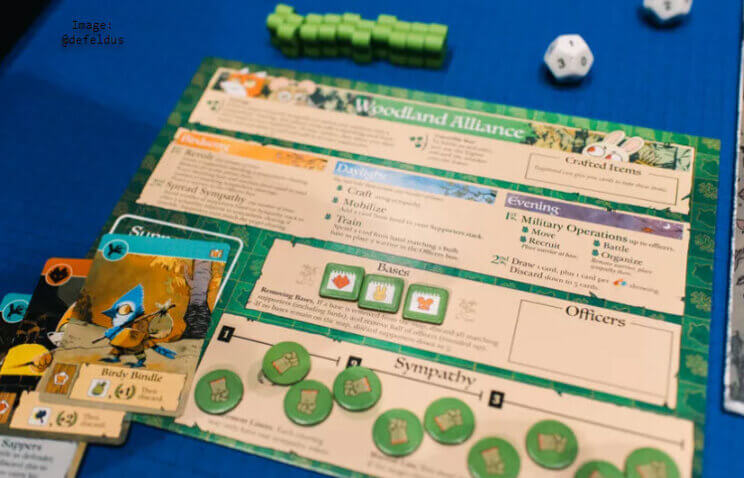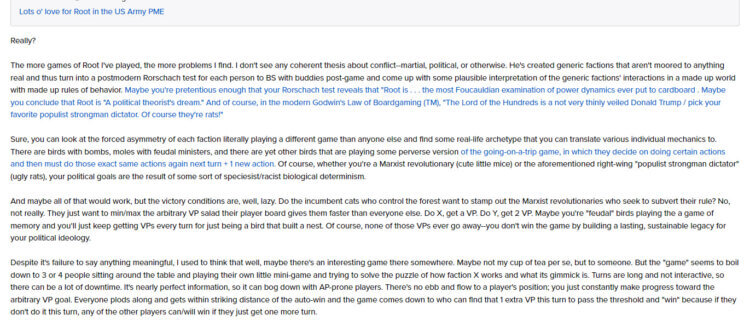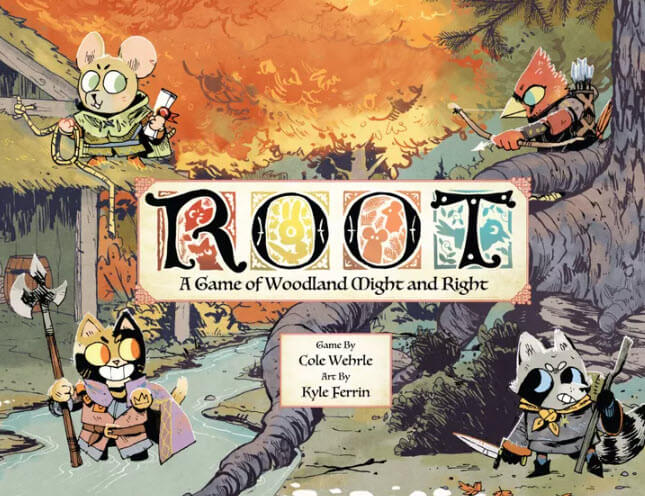Some context.
The lads from No Dice No Glory had some folks from:

https://nodicenoglory.com/2022/09/13/no-dice-no-glory-episode-128-school-of-advanced-military-studies/ on their podcast. Which was pretty interesting.
What however struck a chord for me was the use of Root for training purposes. Certainly a nice way to explore different factions, in a non threatening wargame/Euro cutesy kinda way. I suppose its a kinder gentler prettier war we are training for these days! LOL. But I digress but not for the last time. So in a forum, my bud Rex Stiles on BGG provided this pithy brief review which goes against the grain of much of what I have read about Root. I’ve never played, never had an interest to. Not my cuppa tea.
To be fair, Cole Wherle seems like a pleasant intellectual chap. I’ve had the opportunity to play a real asymmetrical game against Cole the designer way back in the day. He joined us in Austin for a session at a friends home of Angola.
He never came back, I think perhaps there was too much ex-Army style testosterone gushing about the place, along with some burps and snacks at the table, beers being drunk etc. Rough crowd? Not really, just not for him I guess? Or maybe he was not invited back I dunno, I don’t organise these things I’m just there for my winsome looks and charm also to look up rules for the guys who don’t read the rules prior to play!!
However, I tell you what, I used to love playing with those lads, they were more insightful about a design in a 3 minute spiel after playing for 6 or 7 hours when we all de briefed over drinks than the best video reviewer or blogger [present company included :)] .
Which leads me to the ‘review’ part of the reason for the post: Rex

I would suggest that he is an informed gamer. A huge Rail gamer, plays complex sims and Euros so a true Renaissance man from that perspective, with a 600+ title library of games
Well, I digress for the 2nd time.
Here are Rex’s thoughts in response to see the lads @ Army using Root for a learning tool; pithy, witty and funny if you click through to the links in his snap review.
===>
“Really?
The more games of Root I’ve played, the more problems I find. I don’t see any coherent thesis about conflict–martial, political, or otherwise. He’s created generic factions that aren’t moored to anything real and thus turn into a postmodern Rorschach test for each person to BS with buddies post-game and come up with some plausible interpretation of the generic factions’ interactions in a made up world with made up rules of behaviour. Maybe you’re pretentious enough that your Rorschach test reveals that
“Root is . . . the most Foucauldian examination of power dynamics ever put to cardboard . Maybe you conclude that Root is “A political theorist’s dream.” And of course, in the modern Godwin’s Law of Boardgaming (TM), “The Lord of the Hundreds is a not very thinly veiled Donald Trump / pick your favorite populist strongman dictator. Of course they’re rats!”
Sure, you can look at the forced asymmetry of each faction literally playing a different game than anyone else and find some real-life archetype that you can translate various individual mechanics to. There are birds with bombs, moles with feudal ministers, and there are yet other birds that are playing some perverse version of the going-on-a-trip game, in which they decide on doing certain actions and then must do those exact same actions again next turn + 1 new action. Of course, whether you’re a Marxist revolutionary (cute little mice) or the aforementioned right-wing “populist strongman dictator” (ugly rats), your political goals are the result of some sort of speciesist/racist biological determinism.

And maybe all of that would work, but the victory conditions are, well, lazy. Do the incumbent cats who control the forest want to stamp out the Marxist revolutionaries who seek to subvert their rule? No, not really. They just want to min/max the arbitrary VP salad their player board gives them faster than everyone else. Do X, get a VP. Do Y, get 2 VP. Maybe you’re “feudal” birds playing the a game of memory and you’ll just keep getting VPs every turn for just being a bird that built a nest. Of course, none of those VPs ever go away–you don’t win the game by building a lasting, sustainable legacy for your political ideology.
Despite it’s failure to say anything meaningful, I used to think that well, maybe there’s an interesting game there somewhere. Maybe not my cup of tea per se, but to someone. But the “game” seems to boil down to 3 or 4 people sitting around the table and playing their own little mini-game and trying to solve the puzzle of how faction X works and what its gimmick is. Turns are long and not interactive, so there can be a lot of downtime. It’s nearly perfect information, so it can bog down with AP-prone players. There’s no ebb and flow to a player’s position; you just constantly make progress toward the arbitrary VP goal. Everyone plods along and gets within striking distance of the auto-win and the game comes down to who can find that 1 extra VP this turn to pass the threshold and “win” because if they don’t do it this turn, any of the other players can/will win if they just get one more turn.
Meh.”

Reposted with permission.
Original post:

I thought this might be worth sharing as it sheds in its own special way some light on the game, its underlying workings and the group think that appears to be so easily bought into these days on ‘soft wargames’. More on that at a later time.
But what do you think about Root?

How Rex describes it in the final paragraph is how I saw it too, watching other people play it and having a look over their shoulders to see what all the hype was about when the game first came out. Never played it and really don’t have any interest to. A multiplayer, solitaire puzzle with close scoring. People playing their own individual game around the same table, the very definition of a euro, which is great for euro players. I used to play them (euros) a lot and even found some of them enjoyable with the right group. However, euros became stale for me because they tend to nearly all be individual puzzles that feel fairly linear/samey for me, and there’s little interaction, outside of socially at the table. Find the pathway or the formula, score points, rinse and repeat. Some can be extremely tight in their pathways to winning, any deviation from the tightrope will cost you. Lots of people enjoy that, I personally find it boring as you’re just finding out which path the designer wants you to take for victory. Your opponents don’t have much affect on that other than their score, and you don’t have much impact on their paths aside from scoring. Whoever can min/max their way fastest wins.
Root is attractive to eurogamers because it’s a euro, it’s very balanced and relatable because of the cute animals. This all makes it feel unthreatening, since there’s no need to have a grasp of the real-world rock, papers, scissors (lizard, Spock lol) military tactics, terrain use, support assets, logistic considerations etc. all mixed with the chance of the dice (friction/chaos). Mitigation is done through standard eurogame means, and the long-term challenge is in how to determine the right chains of actions to succeed with your individual faction. That exploration keeps is seemingly ‘fresh’, and again, from an entertaining game perspective that’s great. While each faction is unique, they’re also similar in how they can score, keeping the game scoring tight. All of that spells accessibility for the gaming audience. In that regard, it’s a well-designed euro and I applaud Cole for it, and the game’s success. It’s all great from an entertainment perspective, but when aiming for a real-world cerebral military exercise, it can also program your mind that things always balance out. Well, this turn I lost a couple of points but I know I’ll get it back next turn. There’s not much in the way of creating a real sense of fear of loss that creates massive setbacks, a sense of urgency to succeed, probing for and finding weaknesses and exploiting them like we see in wargames. There are balancing mechanisms to ensure this doesn’t happen with euros, which from a playability standpoint is both critical and expected for a game to be entertaining and balanced.
Maybe they’re using these games for ‘training’ because of the asymmetry, which will exercise their minds differently. In that manner, games like Root will serve a purpose, but they’re also limiting in preparing a martial mindset. Maximizing lethality against an opponent while trying to minimize your own casualties as best as possible in order to seize and hold objectives and then press on is the job of the military. In other words, being able to punch the other guy in the teeth repeatedly and have him on his heels reeling backwards. Gaining the advantage and exploiting it, breaking through his lines and his ability to fight back. Playing a game that see-saws back and forth, with minimal advances and things essentially balancing out over a course of turns is great for entertainment but it also conditions a mindset that “everything is going to be ok”. For training purposes, games like this need to be offset by games that induce more stress and a real feeling of danger that things can get away from you if you don’t employ sound strategies and tactics. If the military is using games like those in tandem with games like Root, then it’s not bad to have these euros in the mix. However, they should only be a fraction of that gaming training, enough to expand asymmetric thinking with the majority of the gamin time spent employing lessons learned in a more real-world game setting. Just my thoughts…
but how do you really feel?
I disagree with the concept of the game being non-interactive. There is always a point where players will need to prioritize preventing a faction from winning over advancing their own chances. That is what makes the game interesting for me. Do you trust the next person to damage the current leader? Or do you take it upon yourself to do it? Or, maybe you can slow down the leader while still advancing your own cause a little bit? Whoops, now player C found a way to get to the front, and he becomes the next target. To say that there is no interaction and that everyone is merely solving their own individual puzzle is undoubtedly true for many “Euro games,” but not Root. At least in my experience.
Sold my Root game. Rex put to words what I was experiencing. A poor imitation of “wargame” that is overly hyped and the continued pretensions of its supposed strengths by its sycophants is nauseating
Eric Price, the SAMS instructor who used ROOT in the curriculum, will be speaking about it in the upcoming Connections Online event (Wednesday October 19) so if you register you can beard him about it there.
https://tabletop.events/conventions/connections-online-showcase-2022
Without putting words into his mouth, I would imagine his reply might be something along the lines that it doesn’t matter if the game used is an explicit simulation of something military, or even if it is a particularly good game; the use of these games in the curriculum is to make the players analyse the decisions they make, the how and why of what they decide to do and how they explain it.
I did look for Rex’s comment on BGG that was screenshotted here but could not find it.